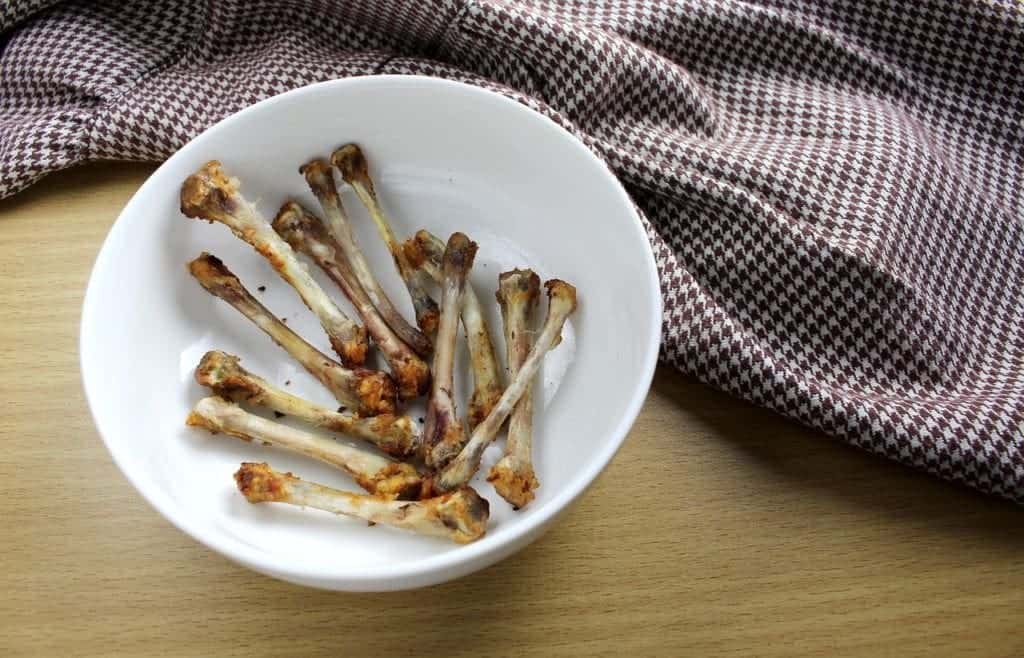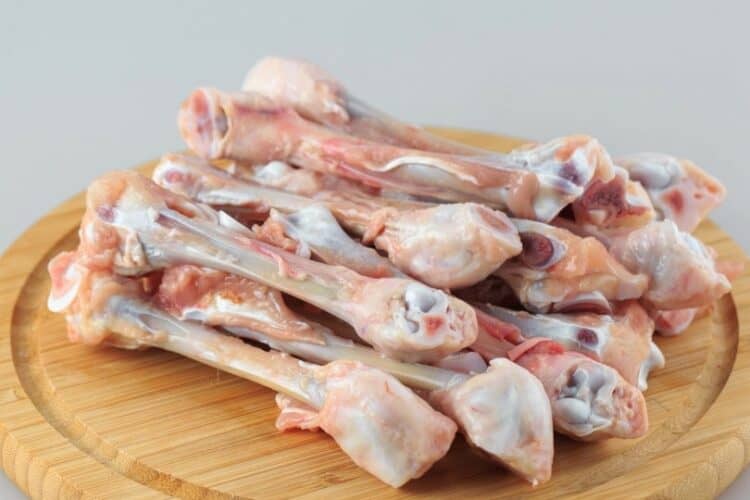Even some of the most well-trained dogs will have a hard time passing up some discarded chicken bones on the sidewalk. Less trained dogs may follow the aroma of your freshly cooked roasted chicken into your kitchen and wolf it down so fast that the damage can’t be undone! However, the question that remains isn’t how well trained your dog is but whether the consequences of their actions will be harmful to them or whether they’ve just scored themselves a tasty meal.
Although chicken dogs aren’t necessarily bad for your dog (they have been eating them for thousands of years, after all), each case is different, and the severity of the outcome has more to do with whether the chicken bones were cooked or raw and the size of your dogs.
What Are the Potential Risks?
If your dog has happily swallowed up a couple of chicken bones and isn’t showing any signs of distress, there’s no need to panic as they’re probably entirely okay. They will be able to digest the bones without too much of a problem. However, some more sensitive dogs may get diarrhea because of the change in their diet.
The risk comes in with cooked chicken bones, as they’re softer than raw bones. Although it’s natural to assume the softer bones would be the safer option to munch up, they can be quite destructive. Soft chicken bones are more brittle and can splinter off when chewed. The sharp edges create a risk of tearing or puncturing your dog’s esophagus or intestinal tract.
If the bones were uncooked, they could also pose a risk as uncooked chicken can contain bacteria, such as salmonella, that is harmful to your dog, and may cause them to vomit and have diarrhea. Other symptoms include lethargy, fever, loss of appetite, and an increased heart rate. It’s important to take your sick dog to the veterinarian to receive treatment if they show any of these symptoms.
Another serious problem may arise if your dog tries to swallow a chicken bone that is too big for their size. The bone can very well get lodged in their esophagus or at the back of their throat and become an esophageal foreign body.

What Do I Do if They’re in Distress?
Whether the symptoms of an esophageal foreign body are brief or continual in your dog, it is life-threatening and requires the expertise of a veterinarian. The problem doesn’t go away, but your dog may not express as much distress as they did initially as they become used to the strange feeling of the bone lodged in their esophagus. Action needs to be taken immediately if you notice any of these symptoms in your dog:
- Pawing at their mouth
- Drooling
- Excessive swallowing
- Gagging
- Coughing
- Lack of appetite
- Signs of distress
If your dog goes untreated, their esophagus will become inflamed and may become scarred. Your dog’s lung may ultimately collapse, or perforation may occur.
If the bone has become lodged at the back of their throats, they’re going to struggle to breathe. If it’s high enough to see and your dog trusts you to stick your hand in their mouth without becoming aggressive out of fear, you can try to pull it out of their throat.
They will still need to see the veterinarian for an examination to make sure that there aren’t any other bones lodged further down and to determine that no damage was done to their throats.
Prevention
You may think that a traumatic event as severe as perforation would never happen to your dog—until it does. Instead of waiting for an accident to happen, rather prevent the possibility entirely. Firstly, don’t give your dog chicken bones, whether cooked or raw.
Secondly, be proactive in keeping chicken bones out of reach when your dog is around and always close the trash lid securely when discarding the bones. Training your dog not to steal food will also reduce their risk of swallowing chicken bones and other foods or substances that may be harmful to them.
Conclusion
Although chicken bones aren’t necessarily bad for your dog, they can cause great damage to their bodies if they splinter or become lodged in their throats or further along their esophagus. It’s better to avoid any risk and not to feed your dog chicken bones, especially if they’re a small breed.
If they do swallow some while you weren’t looking, don’t panic, as they may be perfectly fine. If you do notice signs of distress or illness, take them to the veterinarian immediately.
Featured Image Credit: David Tadevosian, Shutterstock














